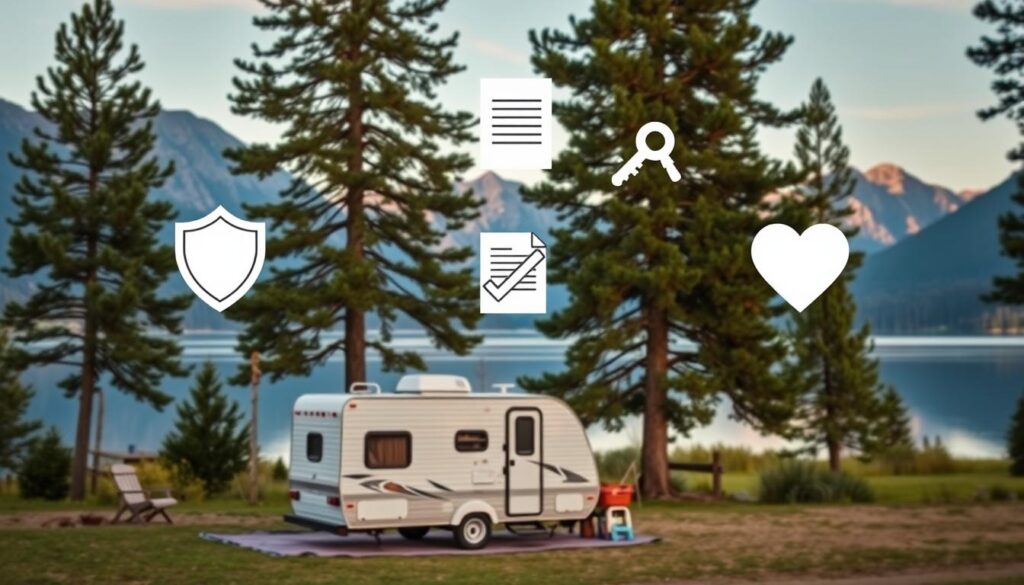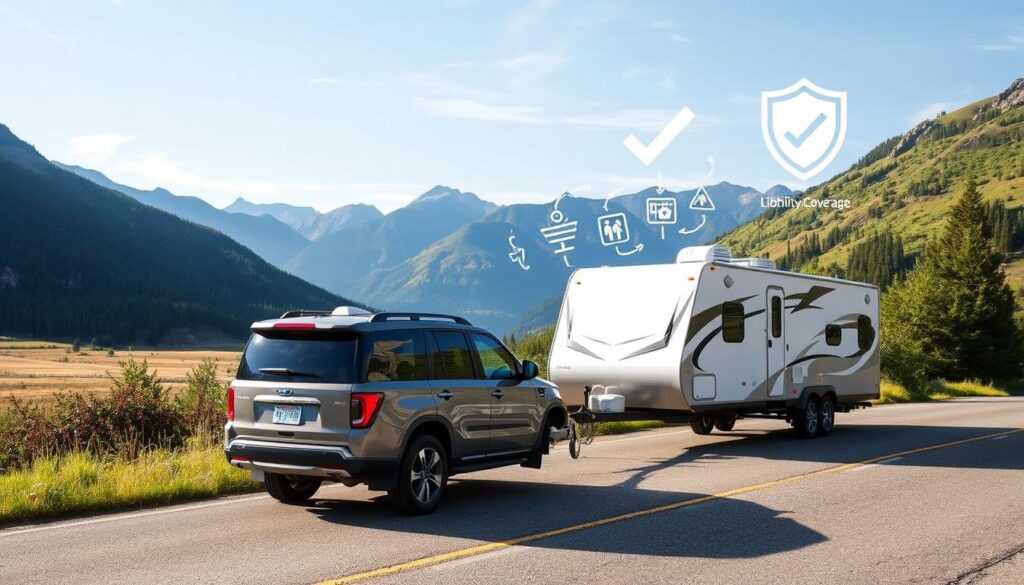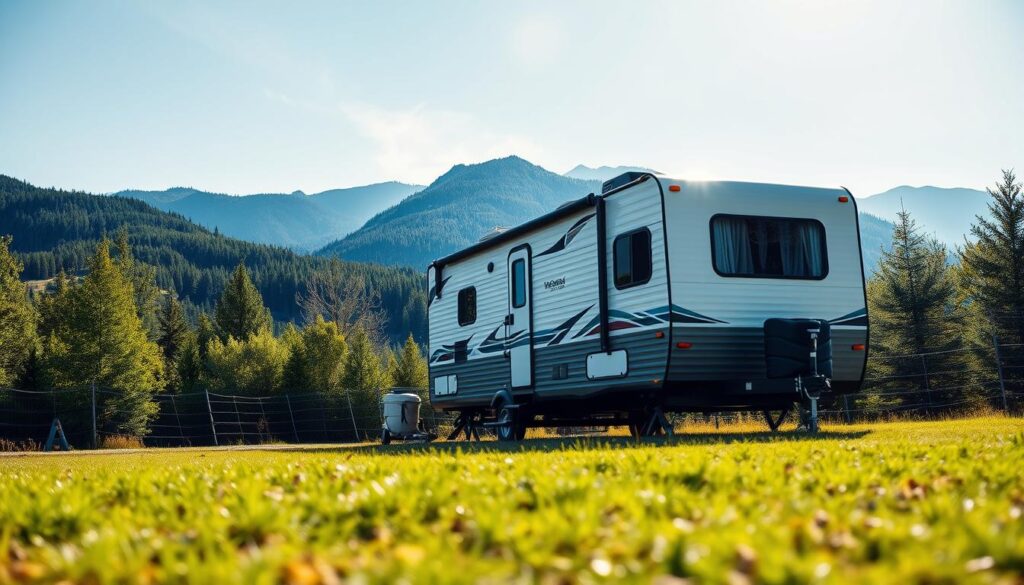As you look out at the endless horizon, adventure calls. Your travel trailer is ready to take you on a journey filled with memories. But, do you need insurance for it? Insurance on a Travel Trailer
The open road is waiting for you. It’s important to protect your investment and stay safe. In this guide, we’ll explore travel trailer insurance needs, benefits, and help you make smart choices for a worry-free trip.
Key Takeaways
- Travel trailers don’t need insurance in any state, but your car’s insurance is key.
- If you finance your trailer, your lender will want insurance to protect their investment.
- All travel trailer insurance policies include comprehensive coverage. Collision coverage might be optional if you own your trailer outright.
- Liability coverage is crucial to protect you from financial loss in an accident, just like car insurance.
- Combining your travel trailer and car insurance can save you money and offer more benefits.
Understanding Travel Trailer Insurance Requirements
Insuring your travel trailer depends on your state’s laws and your lender’s rules. Most states don’t require insurance for travel trailers. But, the towing vehicle must have liability coverage as state laws demand.
State Regulations and Legal Obligations
Fiberglass travel trailers might not need insurance by law. But, they are expensive to fix or replace if damaged or stolen. It’s wise for owners to get insurance to protect their investment.
Lender Requirements for Financed Travel Trailers
If you financed your travel trailer, your lender will want you to have insurance. They need comprehensive and collision coverage until you pay off the loan. High-end fiberglass travel trailers can exceed tens of thousands of dollars in value, sometimes surpassing the towing vehicle’s worth.
Some insurance policies might not cover trailers automatically. You might need to add them separately. Always check your policy to make sure your travel trailer is well-protected.

“Having insurance for a financed travel trailer is vital, as it safeguards the investment and ensures that the outstanding loan balance is covered in case of loss.”
Liability Coverage for Towing Vehicles
When you insure your travel trailer, you need to cover the towing vehicle. Almost every state requires drivers to have a minimum of liability insurance. This is to protect others if you cause an accident.
The amount of coverage needed varies by state. A common example is 25/50/10 coverage. This means at least $25,000 for each person hurt, $50,000 for all people hurt in one accident, and $10,000 for property damage. Having these limits is key to follow state laws and protect your money if an accident happens.
Travel trailers don’t have specific insurance needs, but the towing vehicle’s liability coverage is vital. This coverage helps if the trailer damages someone else’s property or hurts them while being towed. Without it, you could face huge financial losses.
| Coverage Type | Example Minimum Limits | Purpose |
|---|---|---|
| Bodily Injury Liability | $25,000 per person, $50,000 per accident | Covers injuries to others if you are found liable |
| Property Damage Liability | $10,000 per accident | Covers damage to others’ property if you are found liable |
Remember, the liability coverage on your towing vehicle is crucial for protecting you and your assets if your travel trailer is involved in an accident. Be sure to review your policy and ensure you have the appropriate coverage levels to meet your state’s legal requirements.

Comprehensive Coverage for Travel Trailers
Protecting your travel trailer is key. Comprehensive coverage is a vital part of your insurance. It keeps your investment safe from many dangers, so you won’t face expensive fixes or replacements alone.
Covered Perils: Fire, Theft, Vandalism, and More
Travel trailer insurance often covers many dangers. These include:
- Fire
- Theft
- Vandalism
- Severe weather, like hail, wind, and flood
- Collisions with animals
- Other unexpected and uncontrollable events
Each insurance company might list different dangers. It’s important to check your policy to know what’s covered. This broad protection lets you relax, knowing your trailer is safe from many risks.
| Covered Peril | Description |
|---|---|
| Fire | Coverage for damage caused by fire, including from electrical issues or kitchen accidents. |
| Theft | Protection if your travel trailer is stolen or its parts are vandalized. |
| Severe Weather | Coverage for damages caused by hail, wind, flood, and other extreme weather events. |
| Animal Collisions | Protection if your travel trailer collides with an animal while on the road. |

Knowing what your travel trailer insurance covers is crucial. It ensures your investment is safe from many dangers. This lets you enjoy your outdoor adventures without worry.
Collision Coverage: Protecting Your Investment
Collision coverage is key for your travel trailer. It kicks in if your trailer hits another vehicle or object, no matter who’s to blame. This coverage means you won’t have to pay for expensive repairs yourself, keeping your trailer safe.
With collision coverage, your insurance will fix or replace your trailer if it gets damaged in an accident. It’s very useful for newer or more valuable trailers, as repair costs can be high. This way, you can travel without worrying about your investment.
Collision coverage is wise for any travel trailer owner. It’s great for driving on tricky roads or busy highways. By adding this to your insurance, you’re protecting your investment and can enjoy your trips more.
| Collision Coverage Benefits | Why It Matters |
|---|---|
| Pays for repairs or replacement if your travel trailer is damaged in a collision | Protects your financial investment in your travel trailer |
| Covers accidents regardless of who is at fault | Ensures you don’t have to pay out-of-pocket for repairs |
| Especially valuable for newer or higher-value travel trailers | Helps offset the potentially high cost of repairs |
| Provides peace of mind while towing your travel trailer | Allows you to enjoy your adventures without worry |
Collision coverage is a must-have for a full travel trailer insurance policy. It keeps your trailer safe and lets you travel with confidence, knowing you’re covered in case of an accident.
Do You Have to Have Insurance on a Travel Trailer?
Insuring your travel trailer depends on your situation. There’s no state law that says you must have insurance. But, some situations might make it necessary.
If you have a loan on your travel trailer, you’ll need insurance. Lenders want you to have comprehensive and collision coverage until you pay off the loan. This keeps their investment safe.
- Some campgrounds or RV parks might ask for liability insurance to park your trailer.
- But, in most places, you don’t have to have insurance on your travel trailer. Still, it’s a good idea to protect your investment.
Liability coverage is often the only insurance needed in states that require it. This makes it pretty affordable for most people.
Even if you’re not legally required to insure your travel trailer, it’s smart to get the right coverage. It keeps your investment safe and protects you in case of accidents or unexpected events. Knowing about travel trailer insurance helps you make a choice that fits your needs and gives you peace of mind while traveling.
Medical Payments Coverage for Passengers
Insuring your travel trailer is important, and medical payments coverage is key. It protects your passengers in case of an accident while your trailer is parked or being towed.
Medical payments coverage, or “med pay,” covers your passengers’ medical costs. It doesn’t matter who caused the accident. This is great for ensuring your passengers get the care they need without worrying about the cost.
For travel trailer owners, this coverage is essential. It keeps your passengers safe and gives you peace of mind. Knowing they’re protected in case of an accident is crucial.
When looking at travel trailer insurance, ask about medical payments coverage. Make sure it meets your needs. This way, you can enjoy your trips knowing your loved ones are safe.
| Coverage Type | Description |
|---|---|
| Medical Payments Coverage | Helps cover medical expenses for your passengers in the event of an accident, regardless of fault. |
| Liability Coverage | Protects you from financial liability if you are found responsible for an accident that causes injury or property damage. |
| Comprehensive and Collision Coverage | Covers physical damage to your travel trailer, including theft, vandalism, and collisions. |
Remember, coverage needs and options can change based on your state and lender rules. Always check your policy and talk to your insurance provider. This ensures you have the right coverage for your travel trailer.
Full-Time RV Insurance: Protecting Your Home on Wheels
If you live in your travel trailer full-time, you might need a full-time RV insurance policy. This type of insurance offers more protection than a standard policy. It’s designed for those who live in their RV all the time.
This insurance includes liability coverage and loss assessment coverage. It also has other benefits for full-time RV residents. While not mandatory, it’s a great way to protect your mobile home.
A survey by Adventure Club Insurance found that 85% of RV owners are underinsured or uninsured. Only 15% have the right RV policy. The average annual premium is $660, or about $55 a month. This makes it a smart choice for full-time RVers.
Full-time RVers need special coverage for their belongings and liability. Part-time RVers focus on the RV and liability. Weekend warriors might choose insurance for recreational use.
It’s important to check your insurance policy every year or after big life changes. This ensures you have the right coverage for your full-time RV insurance travel trailers, RV insurance for full-time living, or travel trailer insurance for permanent residence.
“Keeping RV insurance policies up to date by reviewing them annually or after significant life changes is crucial to ensuring proper coverage.”
Getting a full-time RV insurance policy gives you peace of mind. You’ll know your mobile home and belongings are safe. This lets you enjoy the RV lifestyle without worry.
Bundling Travel Trailer and Auto Insurance
If you own a travel trailer, you can bundle its insurance with your car’s. This smart move offers big benefits like discounts and easier insurance handling.
Discounts for Multiple Policies
Many insurers give great discounts for bundling travel trailer and car insurance. You can save 10% to 20% or more. This makes it a wise choice for RV fans.
Not only does bundling save money, but it also simplifies your insurance. You won’t have to deal with many providers or payment dates. Instead, one company handles everything for you.
When looking at insurance options, ask about bundling discounts. This helps you find the best deal for your needs.
By using bundling, you can save a lot and feel secure with full coverage. This smart insurance strategy makes your travels more enjoyable.
Top Travel Trailer Insurance Providers
Several major insurance providers offer specialized coverage for travel trailers. Progressive, Nationwide, The Hartford, National General, and Good Sam Insurance are top choices. They provide a range of policy options, from basic liability to comprehensive protection.
To find the best insurance, compare quotes and coverage from multiple providers. Each company has unique strengths, like discounts and specialized features for RVers.
Progressive: Best for Affordability
Progressive is known for affordable travel trailer insurance. They offer disappearing deductibles and accident forgiveness. But, their NAIC complaint index is higher than some competitors.
Nationwide: Best for Discounts
Nationwide offers over 10 discounts, including savings for being claim-free. Their NAIC complaint index is below average, showing good customer service. They cover most states, making them convenient for travelers.
Good Sam: Best for Part-Time RVers
Good Sam Insurance Agency is great for part-time RVers. They offer up to 20% discounts for multi-vehicle policies. Their A+ rating from the Better Business Bureau shows excellent customer satisfaction.
Roamly: Best for Full-Time RVers
Roamly is perfect for full-time RVers. They provide specialized coverage, including emergency expenses and RV rental. As a subsidiary of Outdoorsy, Roamly understands full-time RVers’ needs well.
When choosing travel trailer insurance, consider coverage, customer service, and financial stability. Look for discounts and special features that fit your needs. By comparing top insurers, you can find the right policy for your travel trailer.
Choosing the Right Coverage for Your Needs
When picking travel trailer insurance, it’s key to think about what you really need. Consider the trailer’s value, how often you use it, and if it’s your main home. Your risk level also matters.
Talking to an experienced insurance agent is a smart move. They can help you pick the best insurance for your trailer. They’ll guide you on what coverage you need to keep your investment safe.
- Think about your trailer’s value and how much coverage it needs.
- Figure out how often you use your trailer. This affects the coverage you need.
- Check if your trailer is your main home. This might need extra coverage or a special policy.
- Think about your risk level and how much you can afford to lose in case of accidents or theft.
By carefully looking at your insurance needs, you can get the right coverage. This will protect your investment and give you peace of mind while traveling.
| Coverage Type | Key Benefits |
|---|---|
| Liability Coverage | Protects you from financial liability if your travel trailer causes injury or property damage to others. |
| Comprehensive Coverage | Covers damages to your travel trailer from events like fire, theft, vandalism, and severe weather. |
| Collision Coverage | Provides financial protection if your travel trailer is involved in a collision with another vehicle or stationary object. |
| Medical Payments Coverage | Covers medical expenses for passengers in your travel trailer, regardless of fault. |
Knowing about the different coverages and talking to an agent can help. You’ll get the right insurance for your needs and keep your investment safe on the road.
Factors Affecting Travel Trailer Insurance Rates
Several key factors can impact the cost of your travel trailer insurance. The age, value, and usage of your trailer are crucial. These factors determine your premium costs.
Newer, more expensive travel trailers cost more to insure. The higher the value, the more it costs to replace in case of a loss. Older, less valuable trailers might have lower premiums.
How you use your travel trailer also affects your rates. Trailers used for full-time living or long trips cost more. Those used for weekend getaways cost less. The more you use your trailer, the higher the risk of accidents, which insurers consider when setting rates.
Age, Value, and Usage of the Travel Trailer
- Newer, more expensive trailers have higher insurance costs
- Older, less valuable trailers may qualify for more affordable premiums
- Trailers used for full-time living or extensive travel have higher premiums
- Occasional weekend use can lead to lower insurance costs
| Factor | Impact on Insurance Rates |
|---|---|
| Trailer Age | Newer trailers cost more to insure |
| Trailer Value | Higher-value trailers have higher insurance costs |
| Trailer Usage | Full-time or extensive use leads to higher premiums |
Understanding these factors can help you anticipate your travel trailer insurance costs. This knowledge can guide you in choosing the right coverage for your investment.
Conclusion
Travel trailer insurance is not always required by law, but it’s a smart choice. It protects your investment and keeps your finances safe. Coverage for theft, vandalism, and natural disasters is crucial. Also, liability coverage on the towing vehicle is key to avoid financial loss in accidents.
Knowing what insurance you need and how much it costs helps you make the right choice. This way, you can enjoy your travels without worry. You’ll also be ready for any unexpected problems or damage.
Choosing to insure your travel trailer is a big decision. It affects your future travels. Whether you love the outdoors, travel with your family, or enjoy solo trips, the right insurance makes all the difference. It ensures your journey is worry-free and financially secure.
FAQ
Do pull behind campers need insurance?
Do you have to have insurance on a camper?
Do you have to have insurance on a travel trailer?
What does insurance cover on a camper?
Do you need insurance on a travel trailer?
Do you need insurance on a camper?
Do you have to insure a travel trailer?
Do you have to insure a camper?
Do campers need insurance?
Do I need RV insurance?
Does a camper need insurance?
Do you have to have insurance on a camper trailer?
Do you need insurance for a camper trailer?
Do travel trailers need insurance?
Do you have to insure a camper trailer?
Do you have to have RV insurance?
Does a camper trailer need insurance?
What does travel trailer insurance cover?
Does my auto insurance cover my travel trailer?
Is camper insurance required?
Do RVs need insurance?
Source Links
- Do You Have to Have Insurance on a Travel Trailer? | LendEDU – https://lendedu.com/blog/do-you-have-to-have-insurance-on-a-travel-trailer/
- Do I Need RV Insurance? – https://www.progressive.com/answers/do-i-need-rv-insurance/
- Is Travel Trailer Insurance Worth the Investment? Find Out Here! – https://olivertraveltrailers.com/blog/is-travel-trailer-insurance-necessary/
- RV Insurance: Everything You Must Know – https://www.kiplinger.com/personal-finance/insurance/602528/protect-your-home-on-the-road
- Travel Trailer Insurance for Your Recreational Vehicle – https://www.trustedchoice.com/rv-insurance/camper-rv-types/conventional-travel-trailer/
- How to Insure Utility Trailers and Campers – https://www.berryinsurance.com/blog/trailers-campers
- RV Insurance | Jean Deese Insurance – https://www.deeseinsuranceagency.com/rv/
- RV INSURANCE: A COMPREHENSIVE GUIDE – https://www.jayco.com/blog/RV-INSURANCE-A-COMPREHENSIVE-GUIDE/
- RV and Motorhome Insurance Quotes & Rates – https://www.usaa.com/insurance/vehicles/rv-motorhome/
- Fifth-Wheel Trailer Insurance: 5 Essential Tips 2024 – https://kilgoinsurance.com/fifth-wheel-trailer-insurance/
- Beyond Collision: Understanding RV Insurance Coverage for Awnings and Roofs – https://www.peakesinsurance.com/blog/rv-insurance-awnings-roofs-coverage/
- Does auto insurance cover your recreational vehicle? – Guided Solutions – https://guidedsolutions.com/does-auto-insurance-cover-your-recreational-vehicle/
- RV Insurance – Get a Free Quote Today – https://www.geico.com/rv-insurance/
- RV Insurance | InterWest Insurance Services – https://select.iwins.com/Personal-Insurance/RV-Insurance
- Comparing RV Insurance Vs. RV Warranties And Why You Need Both – https://wholesalewarranties.com/blog/rv-insurance-vs-rv-warranty/
- How To Select Motorhome Insurance Coverages – https://www.progressive.com/answers/motorhome-insurance-coverages/
- RV Insurance: Protecting Your Home on Wheels – https://www.bishs.com/blog/rv-insurance-protecting-your-home-on-wheels/
- 5 essential things to know about RV insurance – Guided Solutions – https://guidedsolutions.com/5-essential-things-to-know-about-rv-insurance/
- Is My Camper Covered By Homeowners Insurance? – https://select.iwins.com/Blog/PostId/396/is-my-camper-covered-by-homeowners-insurance
- RV Rental Insurance – https://www.progressive.com/answers/rv-rental-insurance/
- State Farm – https://www.marketwatch.com/guides/insurance-services/state-farm-rv-insurance/
- Best RV insurance companies of November 2024 – https://www.cnbc.com/select/best-rv-insurance/
- 7 Best RV Insurance Companies of October 2024 – https://money.com/best-rv-insurance/
- Do You Need Insurance on a Travel Trailer? – Panorama Insurance – https://panorama-ins.com/insurance-travel-trailer/
- RV Insurance: A Comprehensive Guide – https://www.thorindustries.com/stories/rv-insurance-guide
- Need Insurance for Your RV? Progressive has You Covered – https://www.rv.com/rv/need-insurance-for-your-rv-progressive-has-you-covered/
- 10 things you need to know to insure your RV – https://www.transwest.com/rv/blog/10-things-you-need-to-know-to-insure-your-rv/
- Florida RV & Motorhome Insurance | Peoples First Insurance – https://pfinsurance.com/productsservices/personal-insurance/rv-motorhome-insurance/
- RV & Boat Storage Insurance: Coverage Explained – https://www.rvstoragedepot.com/blogs/rv-and-boat-storage-insurance-understanding-coverage-options-and-requirements/
- Should I Buy a Travel Trailer: Are Travel Trailers Worth It? | Blackseries RV – https://www.blackseries.net/blog/should-you-buy-travel-trailer.html

